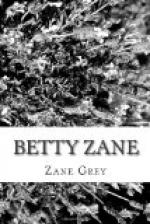Wonderful to relate his long, black hair never adorned the walls of an Indian’s lodge, where a warrior might point with grim pride and say: “No more does the Deathwind blow over the hills and vales.” We could tell of how his keen eye once again saw Wingenund over the sights of his fatal rifle, and how he was once again a prisoner in the camp of that lifelong foe, but that’s another story, which, perhaps, we may tell some day.
To-day the beautiful city of Wheeling rises on the banks of the Ohio, where the yells of the Indians once blanched the cheeks of the pioneers. The broad, winding river rolls on as of yore; it alone remains unchanged. What were Indians and pioneers, forts and cities to it? Eons of time before human beings lived it flowed slowly toward the sea, and ages after men and their works are dust, it will roll on placidly with its eternal scheme of nature.
Upon the island still stand noble beeches, oaks, and chestnuts—trees that long ago have covered up their bullet-scars, but they could tell, had they the power to speak, many a wild thrilling tale. Beautiful parks and stately mansions grace the island; and polished equipages roll over the ground that once knew naught save the soft tread of the deer and the moccasin.
McColloch’s Rock still juts boldly out over the river as deep and rugged as when the brave Major leaped to everlasting fame. Wetzel’s Cave, so named to this day, remains on the side of the bluff overlooking the creek. The grapevines and wild rose-bushes still cluster round the cavern-entrance, where, long ago, the wily savage was wont to lie in wait for the settler, lured there by the false turkey-call. The boys visit the cave on Saturday afternoons and play “Injuns.”
Not long since the writer spent a quiet afternoon there, listening to the musical flow of the brook, and dreaming of those who had lived and loved, fought and died by that stream one hundred and twenty years ago. The city with its long blocks of buildings, its spires and bridges, faded away, leaving the scene as it was in the days of Fort Henry—unobscured by smoke, the river undotted by pulling boats, and everywhere the green and verdant forest.
Nothing was wanting in that dream picture: Betty tearing along on her pony; the pioneer plowing in the field; the stealthy approach of the savage; Wetzel and Jonathan watching the river; the deer browsing with the cows in the pasture, and the old fort, grim and menacing on the bluff—all were there as natural as in those times which tried men’s souls.
And as the writer awoke to the realities of life, that his dreams were of long ago, he was saddened by the thought that the labor of the pioneer is ended; his faithful, heroic wife’s work is done. That beautiful country, which their sacrifices made ours, will ever be a monument to them.
Sad, too, is the thought that the poor Indian is unmourned. He is almost forgotten; he is in the shadow; his songs are sung; no more will he sing to his dusky bride: his deeds are done; no more will he boast of his all-conquering arm or of his speed like the Northwind; no more will his heart bound at the whistle of the stag, for he sleeps in the shade of the oaks, under the moss and the ferns.




